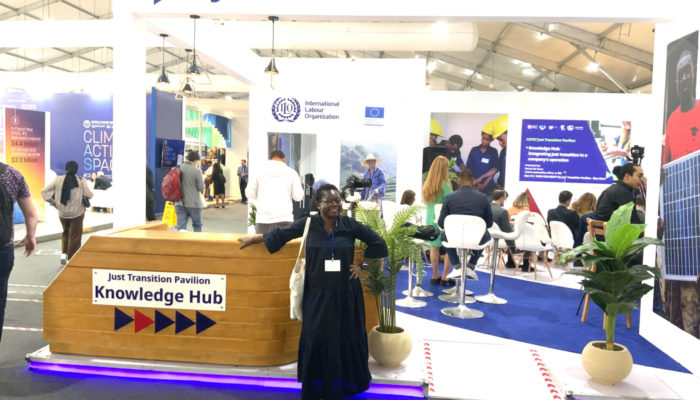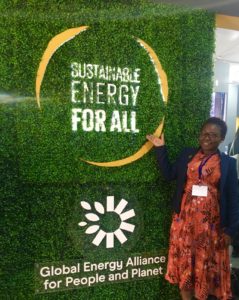
This year, from 6 to 20 November, the United Nation’s COP27 took place in Sharm el-Sheikh in Egypt. The conference hosted several high-level and side events, key negotiations and press conferences, attended by more than 100 Heads of State and Governments and over 35,000 participants who deliberated climate action strategies around the world.
I had the chance to speak with Dr Munira Raji about her experience attending the much-anticipated COP27. Munira is a Sustainable Geoscience and Natural Capital Research Fellow at the University of Plymouth and Postdoctoral Researcher at the University of Hull. She can be reached on Twitter @TheDroneLady
Read on for excerpts from our discussion:
Hi Munira, thanks for taking the time for this interview! Was this your first time attending the UN Climate Change Conference of the Parties (COP)? Could you tell us a little bit about your reflections and takeaways from COP27?
Yes, this is my first time attending a COP conference, and it was fascinating to meet many people from all over the world! The University of Plymouth had a pavilion in the Blue Zone, and I was part of the delegates representing the university at COP27. It was exciting talking to people to highlight how the University of Plymouth’s research fits into climate adaptation, mitigation, and the net-zero agenda. Most of my conversations with other delegates reinforced the linkages between climate change and energy. We are in the middle of climate crises that disproportionately affect developing nations across Africa that face the consequences of climate change and where there is still energy poverty. Some of the discussions I had with people are around having a just transition and renewed urgent calls to action for developed nations to assist developing nations with financial and technical assistance in climate adaptation and mitigation.
What I find interesting is just how vital science diplomacy, international collaboration, and partnership are to tackling the climate crisis. COP is the only conference that brings people together under one roof to discuss strategies for our shared global challenges.
I also attended a few high-level discussions where negotiations were being made, and it was exciting to be at the centre of these discussions; it was a fantastic experience for me!
With extreme weather events continuing to wreak havoc around the world, many experts stress the need to move from debate to delivering action. What are some of the actionable changes discussed at this year’s conference?
I particularly liked the launch of the new ‘Global Shield’ initiative to help developing nations access more financing for recovery from natural disasters and climate shocks. It aims to strengthen social protection schemes and climate risk insurance by financing communities in developing nations to quickly rebuild destructions caused by climate disasters and help these communities mitigate and adapt to some of the impacts of climate change. The UN also launched a global early warning system to help communities detect when a natural disaster is about to occur, so they can quickly evacuate to save lives and livelihoods. I hope countries can build on the momentum from COP27 to ensure that we action some of the pledges and commitments towards mitigating the impact of climate change and make a global net-zero future a reality. Clean, equitable energy transition for all is integral to achieving the long-term UN Sustainable development goals and targets.
It was refreshing to see that for the very first time, children and young people were given an official space at a UN climate change conference. What is your take on involving the younger generation in climate change mitigation?
The impacts of climate change will intensify over time, and the younger generation will become the victims. This is why it is essential to give young people a seat at the table so they can be part of the conversation about their future. I visited the Children and Youth Pavilion and saw a lot of youths holding discussions and showcasing some of the groundbreaking initiatives they’ve been working on. It was impressive to hear some of the actions and activities by the Liberian Youth for Climate Actions in addressing climate change and championing climate education in Liberia.
Any last thoughts or takeaways from your COP27 experience?
My key takeaways are that many African countries are willing to commit to the net-zero agenda. According to the CEO of Sustainable Energy for All (SDG7), Damilola Ogunbiyi, only 0.6% of renewable energy investments are in Africa, and frankly, we can’t expect countries to transition from nothing. Diversifying the energy mix in Africa with renewable energy is fundamental to Africa’s future and long-term energy security. We must recognise that equitable access to affordable electricity and clean cooking is essential for climate change mitigation.
As a Sustainable Energy Geoscientist, I think most geoscientists understand the subsurface more than any science discipline. Our expertise and knowledge of the subsurface can be transferred to geothermal energy, carbon capture and storage, hydrogen, and wind energy.
We have a significant opportunity to shape the energy transition using geoscience diplomacy tools to implement more international collaboration research between countries in renewable energy.




